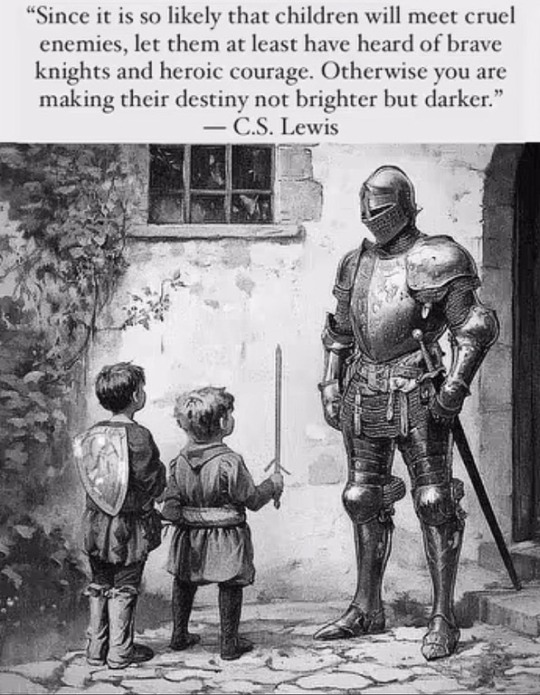#CS Lewis
Explore tagged Tumblr posts
Text
Do not waste time bothering whether you “love” your neighbor; act as if you did. As soon as we do this we find one of the great secrets. When you are behaving as if you loved someone you will presently come to love him.
C.S. Lewis
#catholicism#christianity#works of mercy#spiritual works of mercy#corporal works of mercy#quote#cs lewis#cs lewis quote
5K notes
·
View notes
Text
In King Lear (III:vii) there is a man who is such a minor character that Shakespeare has not given him even a name: he is merely 'First Servant'. All the characters around him – Regan, Cornwall, and Edmund – have fine, long term plans. They think they know how the story is going to end, and they are quite wrong. The servant has no such delusions. He has no notion how the play is going to go. But he understands the present scene. He sees an abomination (the blinding of old Gloucester) taking place. He will not stand it. His sword is out and pointed as his master’s breast in a moment: then Regan stabs him dead from behind. That is his whole part: eight lines all told. But if it were real life and not a play, that is the part it would be best to have acted.
- CS Lewis on King Lear.
3K notes
·
View notes
Text
I really don’t wanna get involved with all the christblr drama but I’ve just gotta say people being so vitriolic over the idea of Christ being portrayed by a female actress when they couldn’t care less about him being portrayed as a literal lion only comes across as insanely sexist
#like. do you see yourselves right now#why is being portrayed as an animal fine but being portrayed in relation to the other half of the human population is not#and before people come at me with all this ''Christ never portrays himself as a woman'' bullshit#let me remind you there are plenty of biblical references where he uses language pertaining to motherhood in relation to himself#you should at least hold that on the same footing as you do the metaphorical descriptions of ''the lion and the lamb''#christian tumblr#christblr#chronicles of narnia#greta gerwig#cs lewis#kitsune speaks
244 notes
·
View notes
Text
My favourite thing about The Lion the Witch and the Wardrobe is that CS Lewis very obviously knew that kids were going to go hunting in cupboards and wardrobes for Narnia because multiple times he very clearly states that the kids did not close the door behind them when they climbed in the wardrobe because that would be stupid and dangerous. He knew some kid was going to lock themselves in the closet and he obviously didn’t want to be responsible for that.
#it’s just funny to me#cs Lewis knew kids#chronicles of narnia#Narnia#the lion the witch and the wardrobe#cs lewis
9K notes
·
View notes
Text

ah yes, because that's always what Narnia has needed..."a new take"...and that's always what Narnia has suffered from...a lack of "Rock 'N' Roll." tweet | deadline interview
#so it's going to be subversive and lack all Christian influences...great#I look forward to their complete and utter failure and hope they burn many hundreds of millions of dollars doing so#to give her such cherished books to ruin just like she did with Little Women...im sick#what can men do against such reckless hate#anti greta gerwig#anti gerwig narnia#anti netflix narnia#Chronicles of Narnia#C.S. Lewis#CS Lewis#mine
1K notes
·
View notes
Text
Reading this book called "Out of the silent planet" where this guy goes to a planet that is uncorrupted by the fall of man and is inhabited by seal-like creatures and all I can think of is this image

#seal perfection confirmed#out of the silent planet#cosmic trilogy#space trilogy#cs lewis#seal#seals
1K notes
·
View notes
Text
Chronicles of Narnia by Tolkien:
"CHAPTER 1 On the northern borders of Lantern Waste, a chilling wind crept over the ground. Rumors of dark forces on the move had been floating among the faunic settlements since midsummer's day..."
Lucy isn't introduced until CHAPTER 24 and in CHAPTER 35, the song that Mr Tumnus entertained Lucy with is reproduced in its entirety, haunting and masterful in the form of ancient Norse epic poetry. Several lengthy excerpts from Tumnus' library books are included in a footnote to the same chapter.
LOTR by CS Lewis:
"In a hole in the ground lived a hobbit named Smeagol, and almost he deserved it..."
772 notes
·
View notes
Text
Tolkien Autism: (sitting in his office in the dark for three days straight) no edith I can’t go to bed until I’ve recorded what each clan of the Elves farts smell like. at first I wanted the Noldorin’s to be cinnamon sandalwood but that contradicted page 3 paragraph 5 of the Ainulindalë so now I’m unable to decide between lilac fields or fresh woodland pine
CS Lewis Autism: hey inklings check out my original fic it’s about my OCs meeting Jesus but he’s a totally badass LION and he’s UNKILLABLE bc he’s got an unlimited god mode status effect (he’s literally god lmao) and he can summon Poseidon and Bacchus and travel through dimensions and gives my—I mean Diggory’s mom a magic apple that cures her cancer and we get revenge on all the kids who bullied me at school and theres unicorns that stab you and dragons and witches and also SANTA CLAUS bc I CAN DO WHATEVER TF I WANT, JOHN!!!!!!
#lord of the rings#the chronicles of narnia#narnia#jrr tolkien#cs lewis#Tolkien: blocked (leaves flames on lewis’s ao3 in guest mode
32 notes
·
View notes
Text

#christian#christian blog#christian faith#christian living#christianity#god is love#jesus christ#christian encouragement#christian memes#christian quotes#christian bible#chritianity#c s lewis#cs lewis#jesus is coming#catholic#he loves everyone so much fyi so it’s not just my flex it’s our flex bb#jesusisgod#jesusislord#faith in jesus#jesussaves#jesus#jesus loves you#belief in jesus#jesus loves us#god is my refuge#god is good all the time#god is real#god#biblical scripture
3K notes
·
View notes
Text
Encouraging fact! The author and theologian CS Lewis defined love as not a feeling, but an action, the active desire for the good of someone. “To wish one’s good.” That is his definition of Biblical Love. Not a fuzzy feeling or a sense of affection; it’s an action. I’ll link a YouTube video or two in this reblog. The words of CS Lewis are far more eloquent and clear than mine.
youtube
youtube

42K notes
·
View notes
Text
C.S. Lewis: oh and yeah, the stars are actually people who are functionally immortal (unless bitten by a witch who's shapeshifted into a snake) and come down to earth for rest periods wherein they look like normal humans and eat fire-berries until they can go be stars again, but they can be banished too and become magicians—
me: hold on
C.S. Lewis: keep up, there are also sea people (not mermaids) who have entire civilisations underwater, with dark purple hair and ivory skin, and they ride giant seahorses, and are very aggressive—
me: wait a second
C.S. Lewis: aren't you listening, because there is also a world underneath Narnia with many different sections, including one where Father Time sleeps until the end of the world, and a world underneath that called Bism where gems live and can be juiced like fruit—
me: just hang on a minute
C.S. Lewis: so you don't want to hear about how a centaur feeds both stomachs?
#narnia#cs lewis#me vs Lewis' approach to worldbuilding#aka dropping the wildest concepts into a whimsical story/ biblical allegory and then just. leaving them.#no further explanation required#ramblings & musings#queue know that it's time to emerge#also I'm listening to HaHB and majorly sideeyeing certain comments on the Calormens
985 notes
·
View notes
Text
I've never seen a normal post about C.S. Lewis and JRR Tolkien it's always just like: Tolkien once murdered someone and Lewis helped him bury the body but he wore a Santa costume just to spite him
#jrr tolkien#cs lewis#the chronicles of narnia#narnia#c.s. lewis#j.r.r. tolkien#jolkien rolkien rolkien tolkien#tolkien#lewis#lotr#lord of the rings#the hobbit
6K notes
·
View notes
Text

1K notes
·
View notes
Text
Midnight Pals: Souper
[at unicorn fuck club] JRR Tolkien: tonight we've got a special story from everyone's favorite fantasy writer GRR Martin: CS Lewis: Peter S Beagle: Hans Christian Andersen: L Frank Baum: Tolkien: whoops shouldn't have said that ha ha Tolkien: i mean, you're all winners in my book
Tolkien: but when i say everyone's favorite fantasy writer Tolkien: i mean terry practchett GRR Martin: oh yeah that's fair CS Lewis: yeah fair Peter S Beagle: fair Hans Christian Andersen: yes yes of course L Frank Baum: that's fair
Terry Pratchett: hello unicorn fuck club today i've got a story about a wizard who is - get this - actually very bad at his job Tolkien: oh ho ho! terry my boy, you've done it again! Pratchett: there's also girl dwarves Tolkien: [suddenly stone-faced] i hate this
Pratchett: but first Pratchett: all this story telling is hungry work! Pratchett: do you happen to have anything to eat around here? Tolkien: are you talking about... Tolkien: having Tolkien: a Tolkien: feast????? Brian Jacques: [squeaking incomprehensibly in rising excitement]
Tolkien: why, terry, my boy, what an idea! Tolkien: instead of merely DESCRIBING a feast, we'll have one! huzzah! Martin: huzzah! Lewis: huzzah! Jacques: [squeaking] i use a mercury head dime as a serving platter!
Pratchett: no no nothing so fancy as that Tolkien: eh? Pratchett: i was more thinking along the lines of Pratchett: soup Tolkien: soup? Pratchett: yeah just a big bowl of heart soup right about now would just be the best thing Pratchett: oo i just love the sound of it!
Pratchett: think about it: no work... no worries... no failures... no waste... when you serve maggi homestyle soups, the finest money can buy yet priced reasonably within your budget Tolkien: interesting! tell us more Pratchett: maggi soup! es ist echt ausgezeichnet!
Pratchett: how often have you had this problem Pratchett: say, you're on a budget but you have to feed your hungry hungry boys Tolkien: oh man i have been there! Tolkien: more times than i can count!
Tolkien: but terry Tolkien: i need something substantial and nourishing for my hungry boys. can maggi soup satisfy? Pratchett: ahh jirt my friend, maggi soup does more than satisfy! Pratchett: as the good people at maggi say, "kartoffelsalat volkswagen fahrvergnugen lebensraum!!"
Tolkien: What's that sizzling sound I hear? Pratchett: Get up! It's soup and eggs, my dear! Martin: What can I cook without much fuss? Pratchett: maggi soup would tickle all of us! Lewis: What's a lunch that's good and quick? Pratchett: Hot Maggi soup mix does the trick!
Pratchett: mm mmm! i tell you, nothing's as good as a rich bowl of maggi soup! buy some today! eat it with someone you love! Neil Gaiman: something's not right here
Gaiman: of course the power of imagination is infinite, friends Gaiman: but in all the worlds in all the multiverses of possibility, i cannot imagine one in which terry pratchett shills for soup Pratchett: [sweats] nein, nein, ich bin der echte terry pratchett!
Gaiman: if you are in fact, the real terry pratchett Gaiman: and not an imposter Gaiman: like the imposter sandman hector hall in The Sandman, vol. 2: The Doll's House Gaiman: then you won't have any trouble telling a joke Pratchett: [sweats] ein witz? du magst ein witz?
Pratchett: [sweats] i mean ha ha of course i can tell a joke Pratchett: i am the real terry pratchett after all Pratchett: [sweating intensifies] and you all know me, i'm a real spaßvogel Pratchett: Pratchett: a-are you sure you wouldn't all rather just have some soup?
#midnight pals#the midnight society#midnight society#terry pratchett#neil gaiman#jrr tolkien#grr martin#cs lewis#brian jacques#peter s beagle#hans christian andersen#l frank baum
3K notes
·
View notes
Text

plot twist it was actually the ghost of CS Lewis in disguise
811 notes
·
View notes
Text
Better comparisons of world building in Narnia vs Middle Earth have probably been written but here's mine:
C.S. Lewis does world building that is more plot driven. We learn things about the world of Narnia as the main characters learn about or experience them in the course of their adventures. This works because the main characters are usually outsiders to the world of Narnia experiencing these things for the first time, like the reader. (And even Shasta, who is from that world, spends most of his book getting into novel places and situations for him, so the same principle applies.) Because Lewis is writing for children, he is more sparing on detail to keep the story moving along. But the details he does include are always with an eye to sparking the reader's imagination. The sea people, the underground realms, the various mythical creatures - all are fantastical and strange and create the impression of a world full of unknown wonders at every turn. Father Christmas is real, because of course he is real, to the childlike imagination.
J.R.R. Tolkien does world building that is more driven by the sheer joy of what he most enjoys writing about. Much of it is plot relevant of course, but a lot of it really isn't - and that's by design. He's showing you his favorite things - languages and poetry and mythic history - and saying, "Look how wonderful they are!" He's writing for an adult audience, so he can afford more leisurely detours. He name drops mythic heroes and references which, if you want to read all of his legendarium, will make perfect sense - but even if you don't, they are usually understood by the characters who inhabit Middle Earth, and create the impression of a world that is ancient, rich in history, and full of meaning. Every seemingly extraneous detail speaks to the superabundant love of the creator for his creation.
Both are 10/10 no notes, I love these nerds.
370 notes
·
View notes